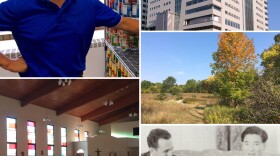One of the legacies of the Vietnam War thrives in countries around the world. During the war, thousands of children were left in orphanages. Many were biracial, the product of relationships between American military men and Vietnamese women. This is the story of two women searching for their biological parents. One has had success thanks to technology. The other is hopeful despite running into dead ends.
Tami Moore of Flint was only 3-months-old when she made the 8-thousand mile journey from Vietnam Detroit. She was one of 3-thousand children brought to America during Operation Babylift in April 1975.
Moore arrived in Detroit with little more than the clothes she was wearing.
"At the time that Operation Babylift happened, when the orphanages were going so fast to get the babies out, a lot of the paperwork was destroyed or put on fire so it wouldn’t be found by other people," said Moore.
I never thought that I would ever speak to my father in this lifetime. -Toni Harrison, Vietnamese adoptee living in the U.K.
Moore was raised in Troy. Now a professional with her own family, Moore searched for any sign of her biological family... but like many adoptees, her search has hit dead ends.
"The adoption agency that I went through is no longer so a lot of their records are not available," said Moore.
She is not alone. Thousands of Vietnamese orphans were brought to the U.S. in the 1970’s with little if any paperwork. Most were the biracial babies of American servicemen. That was the case of another Vietnamese adoptee, Toni Harrison.
"I was born in 1972 I’m not quite sure what month," said Harrison. "My father would have been black American and my mother was a Vietnamese."
Harrison spoke with me via Skype from the United Kingdom. She has a thick British accent. Families took in babies from Vietnamese orphanages not only in the United States, but also in the U.K., Germany, Australia and Canada.
Harrison took a DNA test to confirm her ethnicity. She ended up being linked with 4th or 5th cousins. Her curiosity about her family only grew from there. She tried more tests over the course of several years and then found her biological father..
"I never thought it would happen," said Harrison. "You’re looking for a man in the whole of the United States. It's like looking for a needle in a haystack. I never thought that I would ever speak to my father in this lifetime."
Harrison found her father in North Carolina.But before meeting him, she had to prepare herself to hear the answer of another lifelong question.
"Being a product of war, there are three reasons why I was here – it [conception] would have been prostitution, rape or love," said Harrison. "[I've] always had that on my mind.. growing up.. which one am I? Am I a rape situation, prostitute situation or was I a love situation?"
On September 27, she used Skype to see and hear from her father for the first time.
Harrison learned her father, now lives in a nursing home after being paralyzed in a car accident. She also learned she had 5 half-siblings born before he went to war.
"To hear him actually say I love you is surreal," said Harrison.
Then she learned about how she was brought into the world.
"He lived with my mother for a year and a half and he loved my mother very much," said Harrison. "So to hear his voice say those words the most amazing off my shoulders, it made me a free person. He knew I was expected and she was having me."
Her father was a Drill Sgt. at the time her mother became pregnant.
"He had a call to leave under orders," said Harrison. "He knew basically from that call he wouldn’t see my mother and he would never see me. He didn’t even know if I was a boy or girl."
To hear him actually say I love you is surreal. - Toni Harrison, Vietnamese adoptee living in the U.K.
Full of answers and hope, Harrison will fly from the UK to North Carolina soon to meet her father and extended family face-to-face. All the while, she is still looking for her biological mother. But she holds no malice for being orphaned by her.
"The story is not black and white why our mothers give us up," said Harrison. "I’m a great believer that a lot of our biological mothers were very scared, they were very young. They had to give us up under pressure from their own families."
Back in Michigan, Tammy Moore is actively learning about Vietnamese culture. She also took a DNA test.
"It did say I was all Asian," said "It said it I was a little bit northern Asian and majority was southern Asian [DNA]"
Moore hopes to return to Vietnam place one day.
Editor's Note: I am also a Vietnamese-American adoptee. My life began in 1973 in a village 100 miles south of what is now Ho Chi Minh City in southern Vietnam. I’ve never met my biological parents and I was left in an orphanage before I was one week old. A few months later, I was flown to Colorado and handed over to the waiting hands of my adopted parents.








